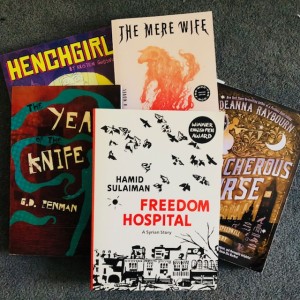 The works read but yet to be reviewed are piling up, so here’s a new roundup to clear away part of the deluge.
The works read but yet to be reviewed are piling up, so here’s a new roundup to clear away part of the deluge.
The Mere Wife by Maria Dahvana Headley is a retelling of Beowulf from the monster’s point of view, set in a possibly not-so-future world where the rich live in protected enclaves. Stark and beautifully told, the story raises the question of who the actual monsters are and whether they haven’t been residing in us all along. (Farrar, Straus and Giroux; release date 17 July 2018)
A Treacherous Curse by Deanna Raybourn is the second in what feels very much like a series, following A Perilous Undertaking. It reads a lot like Elizabeth Peters’ Amelia Peabody series but with a much more sexually outspoken protagonist named Veronica Speedwell and a dose of fantasy. I initially thought Speedwell’s love interest was Bram Stoker, which actually turned out not to be the case. A fun, light read. (Berkeley Original, 2018)
The Year of the Knife by G.D. Penman is entertaining urban fantasy in the police procedural tradition, and will remind the reader of a Ben Aaronovitch novel with a slightly smaller cast. Meerkat has been putting out some very solid stuff, and this is another example of that. (Meerkat Press, 2017)
Two graphic novels, very different from each other, round out the list. The first is Freedom Hospital: A Syrian Story by Hamid Sulaiman, winner of the English PEN Award. This book is graphic, a brutal and heart-wrenching introduction to conditions in Syria in 2012. The art is simple, sometimes with the quality of a slogan stenciled on a wall: I could image image after image from the book used in that way. Recommended but not light reading. (Interlink Publishing Inc., 2018 American Edition)
Henchgirl, by Kristen Gudsnuk, comes from Dark Horse Books and is a fun exploration of the economics of supervillainy, particularly for the minions and henchfolk just trying to make an honest living. Clear and charming drawing with a nice sense of whimsy. (Dark Horse Books, 2017)
